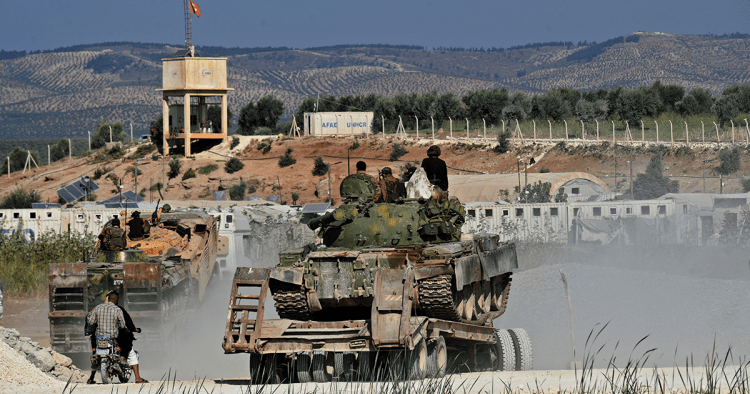In a dramatic turn of events, the rapid collapse of Bashar al-Assad’s government in late 2024 has opened a new, uncertain chapter in Syria’s history. Once seen as unshakable, Assad’s regime disintegrated almost overnight, with little resistance as the capital fell. The country now finds itself under the stewardship of Ahmed al-Sharaa, more widely recognized by his former nom de guerre, Abu Mohammed al-Jolani.
Al-Sharaa, once a key figure in the jihadist landscape, now leads a country trying to rebuild from the ruins of civil war. His group, Hayat Tahrir al-Sham (HTS), rose from the ashes of the al-Nusra Front, originally aligned with both al-Qaeda and the Islamic State. Over the years, Sharaa distanced himself from global jihad, rebranding HTS as a Syria-centric force. By 2017, HTS had broken ties with both of its parent terror networks and absorbed other Islamist factions, asserting a new focus on local governance rather than international militancy.
This strategic shift culminated in HTS taking control of much of western Syria. When Assad’s government finally fell, Sharaa’s forces entered Damascus with barely a shot fired. In an unexpected pivot, HTS formally dissolved, and Sharaa emerged as the transitional head of state, installed by Syria’s newly formed General Command.
The Rise of Uyghur Fighters in Syria
One of the most controversial elements of this transition has been the integration of Uyghur militants into the new Syrian military structure. Fighters belonging to the East Turkistan Islamic Movement (ETIM), also known as the Turkistan Islamic Party (TIP), have been granted official positions within the reconstituted army. Their inclusion is not symbolic. Around 2,000 Uyghur fighters are now embedded in the military, many in commanding roles. Among them is Abdulaziz Dawood Khodaberdi who is better known as Zahid, a former ETIM commander who now holds a senior military post.
This development has not gone unnoticed, especially by China. For years, Beijing has warned of the danger posed by ETIM, which it accuses of fomenting unrest in its Xinjiang region. These militants have featured prominently in propaganda videos calling for jihad, some directly threatening Chinese interests. China’s diplomatic efforts to isolate Uyghur militants such as pressuring the Taliban to prevent ETIM activity near the Wakhan Corridor could have yielded mixed results. Now, seeing these fighters legitimised within a foreign military, and one under a leader once labelled a terrorist, has significantly raised China’s anxiety.
Ironically, the same countries that long viewed Sharaa and his cohorts as extremists are now approaching him with cautious diplomacy. Western nations are particularly eager to prevent another wave of refugees and are exploring ways to support Syria’s stabilisation—without fully endorsing its new leadership. There is a quiet, pragmatic push to normalise relations and possibly lift sanctions, driven largely by geopolitical necessity rather than ideological agreement.
The Middle East’s power brokers have also adjusted to the new reality. Gulf states, once silent on China’s treatment of Uyghurs, are now engaging with Damascus without echoing Beijing’s concerns. Al-Sharaa’s government, for its part, appears more interested in consolidating power internally and securing international recognition than in becoming entangled in global ideological conflicts.
In this rapidly shifting landscape, China finds itself diplomatically cornered. Despite recent success in brokering deals in the region such as mediating between Iran and Saudi Arabia, or uniting Palestinian factions and its influence over Syria is waning. Even Israel, which might share concerns about the rise of militant Islamists in Syria, is increasingly at odds with Beijing due to China’s pro-Palestine stance.
For Washington, the fall of Assad is both an opportunity and a dilemma. While the regime change weakens Iran’s and Russia’s footholds in the region, it also introduces unpredictability. The U.S. had once designated ETIM a terrorist group but later removed it, citing insufficient evidence—an act seen by Beijing as politically motivated. With ETIM now gaining ground, the stage is set for further clashes in global counter-terrorism narratives.
A critical but often overlooked consequence of the intensifying US-China rivalry is how it inadvertently benefits terrorist organisations worldwide. As both powers concentrate their diplomatic, intelligence, and military resources on countering each other, attention has been diverted from collaborative counter-terrorism efforts. Terrorist groups operating in power vacuums like Syria have exploited this distraction, consolidating their positions while global powers remain fixated on great power competition rather than countering extremist threats.
In the midst of Syria’s unpredictable transformation, China finds itself increasingly sidelined—despite years of aggressive diplomacy and soft-power investment across the Muslim world. While it has projected itself as a peace-broker in the Middle East, its credibility is undercut by its own domestic policies, especially the heavy-handed repression of Uyghur Muslims in Xinjiang. This contradiction has made it difficult for Beijing to gain genuine support on the ground, even among its supposed allies. Now, with Uyghur militants ascending to positions of power in Syria’s restructured military, China is staring at a serious blowback. Its failure to prevent this rise—despite extensive intelligence and diplomatic leverage—highlights not only a blind spot in its counter-terror strategy but also a broader erosion of its influence in a region where image, trust, and consistency matter as much as power.
The blame for this deteriorating security environment can be largely attributed to China’s inconsistent approach to terrorism. Instead of standing united against the terror networks fostered by countries like Pakistan, China has chosen to support such actors when it aligns with its strategic interests. Beijing’s protection of Pakistan in international forums, shielding it from accountability for harbouring terrorist organisations, demonstrates its willingness to subordinate genuine counter-terrorism to geopolitical calculations. Rather than joining the international community in confronting terrorist safe havens, China has prioritised challenging US influence shortsighted strategy.


